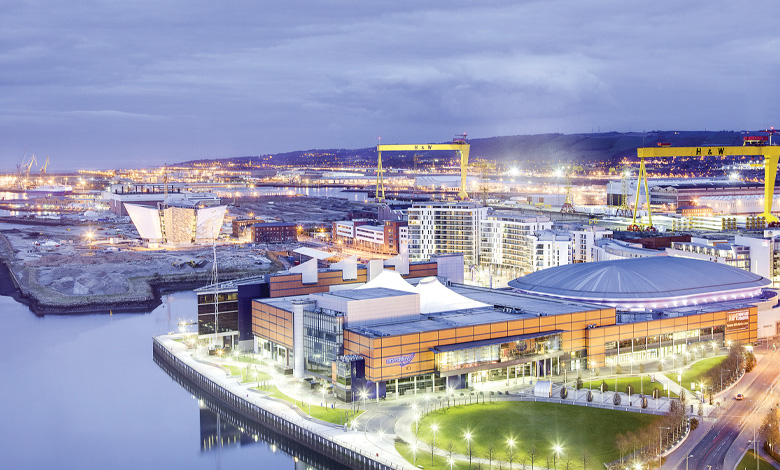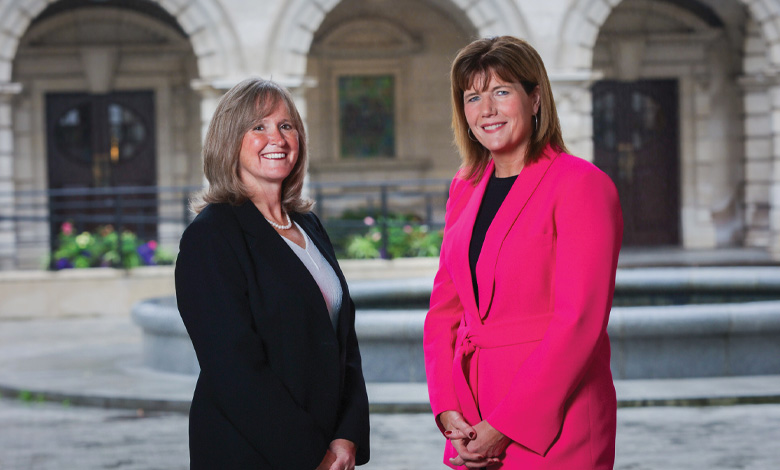Net Zero Belfast

When it comes to carbon, there are only two numbers that really matter – 1.5 million and zero, write Clare Guinness, Chief Executive, Belfast Chamber of Trade and Commerce and Debbie Caldwell, Climate Commissioner, Belfast City Council.
1.5 million? The number of tonnes of carbon that Belfast emits annually. And zero? That is where we need to get to. DAERA is currently developing a carbon budget for Northern Ireland through to 2027. Exceeding this budget would not only leave us exposed to legal challenge but destroy our global reputation – along with our international ambitions.
Belfast has a massive opportunity here – we have the natural resources, the technology, and the talent to make this a truly pioneering place; an exemplar to lead the race to net zero. Our modest scale is an advantage – enabling us to move fast and show how this small place can achieve big ambitions.
We are unique, and we have market access like no other place in Europe. Our abundance of wind and geothermal energy, combined with ground-breaking local technology, can provide sustainable, reliable, and affordable green energy, and remove our reliance on imported fossil fuels.
In Northern Ireland, single institutions hold majority control across electricity, gas, water, and public transport. This means that, in theory at least, we can be swift and efficient making sweeping changes at scale.
That theory is already becoming a reality, with Translink on schedule to decarbonise its bus fleet. By 2025, half of all Belfast Metro services will be zero emission, with all Metro services planned to be net zero by 2030. This, coupled with attracting more people onto public transport, will help decarbonise the city’s transport. NI Water is also levering its assets to deliver green energy solutions, and the Housing Executive is retrofitting 300 of its houses with energy efficiency measures, low carbon heating, renewable power generation, and storage with improved householder awareness. It also plans to deliver a wider programme at scale from 2026/27 to address the climate crisis and reduce fuel poverty.
The rest of the public sector will surely follow suit, and ideally at pace. By harnessing public assets, and public procurement, it can drive green growth across the region. The private sector will respond rapidly – we have a swathe of agile and talented SMEs that will quickly develop green supply chains.
Belfast’s tertiary education sector is second to none. Our world class universities and colleges are delivering world class talent pipelines. Further investment in apprenticeships and skills programmes, funded by a Northern Ireland investment zone for example, would ensure that we have the capacity to reach net zero, whilst also creating jobs and building prosperity in an inclusive way.
There are some stunning examples of how Northern Ireland companies are leading the way in green technology. Just look at recent developments in new hydrogen technologies (Catagen), net zero marine transport (Artemis Technologies), and permanent magnet recycling (Ionic Technologies). In addition to that capability, note also the capacity in Belfast Harbour, where single control over a huge landbank with multiple uses (residential, tourism, education, industry, port, and airport) provides an unrivalled ability to test, demonstrate, and commercialise green technologies across two regulatory markets.
Given that cities account for 70 per cent of global emissions, they must play a pivotal role. The Belfast Agenda (currently out for consultation) sets out a bold plan to tackle climate change. This includes bringing nature back into the city, making the food system more sustainable, creating a more circular and sustainable economy, and supporting innovation. This will require the expansion of our natural systems in areas where they are most needed – such as our inner city. It means transforming our throwaway economy into one where waste is eliminated, resources are circulated, and nature is regenerated and nurtured, and it means ramping up investment in advanced green solutions for energy, transport, and manufacturing.
Belfast’s Local Area Energy Plan (currently in development) applies a whole systems approach to net zero. This data-rich, spatial roadmap will unlock investment into the delivery of smart local energy systems across the city, decarbonising our buildings and transport systems in the most cost-effective way, whilst also looking for opportunities to develop skills. Leaving no one behind, we will maximise the social opportunities that the transition presents and reduce the risks, so that everyone benefits.

Innovation is key. Northern Ireland has a growing GreenTech sector which cuts across all elements of low carbon and green economy, with significant technology development and proven use. A Net Zero Tech Park in Belfast’s Innovation District, dedicated to the development and deployment of green technologies, would support the growth of the green economy and achieve our net zero goals.
The aim is to expand an existing cluster of net zero technology companies to grow Northern Ireland’s GreenTech sector and help realise the objectives of the Green Growth Strategy. Situated within the Harbour Estate, with access to Queen’s University, Ulster University, and Belfast Metropolitan College, the park will provide the facilities to trial and unlock new high-growth technology for domestic use and export. Investment in the physical and digital infrastructure to develop a GreenTech ecosystem will encourage innovation and collaboration amongst existing companies and start-ups to draw in further capital. By leveraging existing and planned assets and investment, the park could become an exemplar of a low carbon economy, creating opportunities for employment and green shoring.
Let’s change before we are forced to, through collective design and delivery, not disparate initiatives with bit part solutions.
Let’s build a portfolio of projects to attract private patient capital, gaining competitive advantage for our place and our people, putting Belfast and Northern Ireland top of the list for international investors.
Let’s turn future adversity into current opportunity.
And together, let’s make our green region the envy of all, paving the way to a brighter, cleaner, more prosperous future.
Have your say on The Belfast Agenda: Draft Strategic Plan 2023 – 2027 | Your say Belfast (belfastcity.gov.uk) before 2 October 2023
Net Zero Belfast

E: caldwelld@belfastcity.gov.uk
W: www.belfastcity.gov.uk





